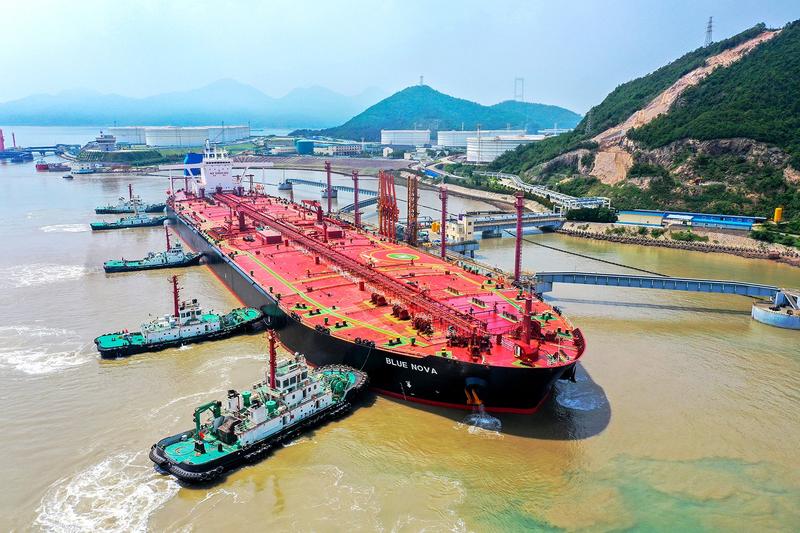 An oil tanker is berthed at a port in Ningbo, Zhejiang province, in September. (YAO FENG / FOR CHINA DAILY)
An oil tanker is berthed at a port in Ningbo, Zhejiang province, in September. (YAO FENG / FOR CHINA DAILY)
China's dependence on crude oil imports has dropped for the first time in the past two decades in 2021, from 73.6 percent in 2020 to 72 percent in 2021, official figures said.
Total crude imports declined last year to 513 million metric tons, down 5.3 percent year-on-year-the first time it has fallen in the past 20 years, the China Petroleum and Chemical Industry Federation (CPCIF) said.
Analysts attribute the drop of crude imports and decreasing energy dependency to increasing efforts by domestic energy companies in local oil field exploration and exploitation in the past few years, which has further enhanced domestic energy security.
Fu Xiangsheng, vice-chairman of the CPCIF, said the country's major oil companies, including China National Petroleum Corp, China Petroleum and Chemical Corp and China National Offshore Oil Corp, have ramped up exploration investment during the past few years with a batch of oil and gas fields coming on-stream, which in turn contributed significantly to the country's decreasing reliance on oil imports.
China has made tremendous progress in increasing domestic oil and gas production over the past few years, and is also becoming more self-sufficient in energy supplies thanks to rising domestic oil and gas production in recent years, said Luo Zuoxian, head of intelligence and research at the Sinopec Economics and Development Research Institute.
The oil majors' mastery of oil and gas exploration technology has also been gradually on the rise, which will inject momentum into reform of the country's future oil and gas systems and mechanisms, Luo said.
CNOOC, the country's top offshore oil and gas driller, said its planned capital expenditure for 2022 will be between 90 billion yuan ($14.14 billion) and 100 billion yuan, with exploration, development, production and others to account for approximately 20 percent, 57 percent, 21 percent and 2 percent, respectively, of total its spending.
It will also introduce 13 new oil and gas fields this year, while it also plans to drill 227 offshore exploration wells and 132 onshore unconventional exploration wells.
The country's oil behemoths have also stepped up construction of storage facilities and accelerated building of trunk oil and gas pipelines to ensure domestic energy security.
The China Offshore Energy Report released by the CNOOC Energy Economics Institute, a think tank under China National Offshore Oil Corp, said China is becoming more self-sufficient in energy supplies in recent years, with the energy self-sufficiency rate reaching more than 80 percent in 2021.
China's energy self-sufficiency rate has been on a steady growth track in recent years, with the country's total energy production rising to 4.18 billion tons of standard coal last year, up 2.5 percent year-on-year, it said.
Fu said while the country's ongoing efforts to peak carbon by 2030 and achieve carbon neutrality by 2060 led to falling oil imports, the high oil price also contributed to a decline in imports.
The federation said oil and gas equivalent last year rose 5.1 percent year-on-year. Crude output rose 2.4 percent year-on-year to 199 million tons, up for the third consecutive year, while domestic gas production rose to 205.3 billion cubic meters, up 8.2 percent year-on-year.
The domestic petrochemical industry saw its total revenue reach 14.45 trillion yuan last year, up 30 percent year-on-year. Total profit for the first time exceeded 1 trillion yuan to 1.16 trillion yuan, up 126.8 percent year-on-year. Both revenue and profit rose to record highs.
According to Fu, domestic crude processing volume exceeded 700 million tons last year, up 4.3 percent year-on-year. Total output of major chemicals rose 5.7 percent year-on-year, he said.
The total amount of petrochemical companies also rose for the first time in five years to 908, a result of the country's efforts in weeding out outdated capacity and shutting down polluting petrochemical companies.
Shutting down the polluting and outdated capacity left room for those with better technologies and management advantages, Fu said.
The federation forecasts that the petrochemical industry in China, though still challenged with uncertainty from COVID-19, downward pressure on the economy, uncertain product prices, and strained supply chains, has numerous opportunities this year as China's petrochemical market has much room for further expansion.


